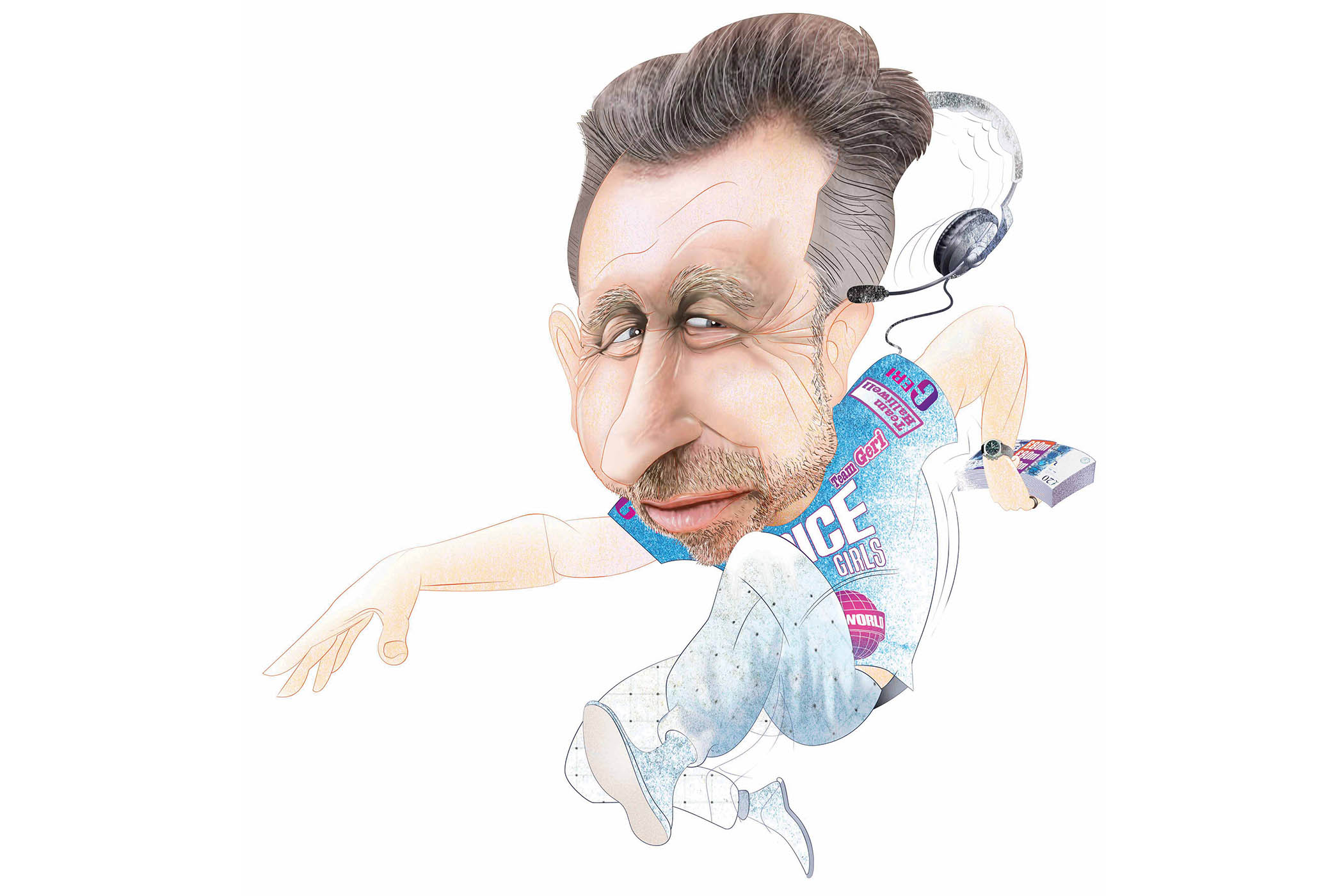Illustration by Andy Bunday
Is Christian Horner the most divisive character Formula One motor racing has ever seen? When he finally left the Red Bull team this week, his departure felt like the culmination of a long goodbye. Known to millions of viewers for his appearances on the Netflix F1 docuseries Drive to Survive, the 51-year-old former team principal was axed shortly after the British Grand Prix at Silverstone in July, and divested of his Red Bull director duties in mid-August.
Allegations of “inappropriate behaviour” and “coercion” involving texts between Horner and a female colleague (now working on another team) were made public last year. Lead Red Bull driver Max Verstappen’s father, Jos, with whom Horner had a fraught relationship, wanted him removed. However, I’m told this may have been less significant than other factors: the complex power struggle with Austrian parent company Red Bull GmbH, the loss of key personnel including designer Adrian Newey, and the decline in form with McLaren overtaking Red Bull as the dominant F1 team.
Horner’s severance package is reported to be around £80m (although some close to the action reckon it’s more like £60m): a lot, even for a sport as wealthy as F1. But then, Horner was with Red Bull since its inception. At 31 he was the youngest team principal, he was paid £10m a year, and he had a contract running until 2030. He also succeeded against the odds. As the sports writer George Simms tells me: “Horner was in the era when it was just Mercedes and [driver] Lewis Hamilton winning everything year after year, and everyone was just bored of it.” Over his two decades in charge, Horner shattered Mercedes’ dominance, leading Red Bull to eight Drivers’ Championships and six Constructors’ Championships as well as 124 race victories.
There is talk of Horner and his wife, Geri Halliwell, taking a belated honeymoon
There is talk of Horner and his wife, Geri Halliwell, taking a belated honeymoon
Regarding the text scandal, Horner denied the behaviour, and was twice cleared, but the optics were excruciating. Horner, with his strained-looking wife of 10 years, former Spice Girl Geri Halliwell, F1’s starriest – and sometimes smuggest-looking – celebrity power couple were brought low: reduced to patrolling the paddocks, hands clutched in a grim display of unity.
Having met Geri myself (years ago, post-Spice Girls), I was reminded of how fiercely protective – verging on paranoid – she seemed about her privacy: so one presumes the scandal was torture for her. Even the F1 co-founder Bernie Ecclestone, a staunch Horner ally, is quoted as despairing of it. “He was just an idiot,” Ecclestone said: “He was a 50-year-old man who thought he was 20, thought he was one of the boys.” Ecclestone also thought Horner was generally perceived as “getting away with things”.
Is there truth in this? Certainly, ego seemed to feature in Horner’s rise and fall. Red Bull’s Helmut Marko observed the team had become “more ‘Christian Horner’ than ‘Red Bull racing’”. Professionally, Horner first competed in the Formula-racing junior leagues before launching the team Arden and helming Red Bull, formerly Jaguar – his appointment supported by Ecclestone. As far as his personal life goes, he was raised in Warwickshire and had a child with his first wife, Beverley Allen, who sadly recently passed away. He has another child with Geri, whose daughter he also adopted.
It’s impossible to discuss Horner without talking about Drive to Survive: their success seems conjoined. The fly-on-the-wall, paddock-based soap opera is credited with sparking the global surge of interest in F1, pulling in swaths of younger fans – and female ones. Critically, it also enthralled the US, which now hosts three Grand Prix races: in Austin, Texas; Miami, Florida; and Las Vegas, Nevada.
Horner bemoaned being “at the mercy of the producer’s script”, but he was the breakout star – Drive to Survive’s ruthless, acerbic answer to Simon Cowell. Simms credits him with helping to modernise the concept of motorsport for TV audiences, saying: “He understood what Formula One was – that it’s an entertainment product rather than a hard-nosed sport. To a certain extent, he was playing a character, but he knew what that character needed to be.”
Drive to Survive is where Horner’s rivalries with other team principals played out, including: a quasi-pantomime with Mercedes’ Toto Wolff. But there was something more vehement with McLaren’s Zak Brown, the latter speaking pointedly recently of the “healthier” atmosphere in the paddocks since Horner’s departure. Horner also fostered an upstart/underdog/punk identity for Red Bull, repeatedly pointing out that it was “a subsidiary of an energy drinks company” up against established automotive companies – though this seemed less credible the more successful Red Bull became.
Newsletters
Choose the newsletters you want to receive
View more
For information about how The Observer protects your data, read our Privacy Policy
Controlling as his reputation can be – one person describes him to me as “self-important, bordering on maniacal” – Horner was known to be devoted to Red Bull, serving as team principal, coach, driver-manager, strategist and more. According to those I spoke to, Horner was reputed never to miss a race, and was uncommonly approachable for the media.
Did all this history and graft, combined with the global impact of Drive to Survive, make Horner feel invincible – so quintessentially “Red Bull” that it would be inconceivable to unseat him? If so, he was mistaken. Horner’s replacement, Laurent Mekies, has already secured victories at the Italian and Azerbaijan Grands Prix.
What comes next for the forcibly pit-stopped Horner? There is talk of the Horners taking a late honeymoon in Scotland. Horner once said: “Family time is the biggest thing that keeps my feet on the ground.” But he has also said: “Winning is addictive.”
One key facet of Horner’s exit package was the shortening of “gardening leave”, which would allow his return back into F1 before the second half of the 2026 season. As is the way with these things, rumours swirl: from Horner forming a consortium to purchase Alpine with his friend Flavio Briatore to his taking over at Ferrari, Aston Martin or … who knows? This time Horner is said to be seeking equity – a stake in a company, similar to Wolff’s deal with Mercedes.
In the meantime, it could be that his singularly forceful presence is missed at the paddocks – at least by Netflix.
Christian Horner
Born
16 November 1973
Alma mater Warwick School
Work Former Red Bull F1 team principal
Family Married with three children



